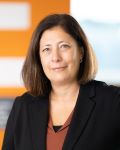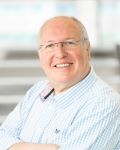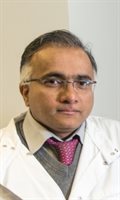Who Are We?
Nottingham Breast Cancer Research Centre brings together a multi-disciplinary team of over 100 breast cancer researchers including oncologists, surgeons, pathologists, scientists, clinicians and other healthcare professionals.
Management Committee Members
 Dr Cinzia Allegrucci
Dr Cinzia Allegrucci
Stopping the cells that initiate and fuel breast cancer
My research team focusses on discovering how stem cells in the breast tissue became cancerous. Normal stem cells have the unique properties of proliferation and regeneration within a tissue but these features become critical when dysregulated and stem cells transform into “cancer stem cells”. Cancer stem cells can proliferate indefinitely and are inherently resistant to standard cancer treatments, including radiotherapy and chemotherapy. So finding a way to target these cells will allow hitting cancer where most hurts. Our laboratory has discovered important genes that control cancer stem cell proliferation and we hope that our research will lead to new treatments that can specifically target these tumour-initiating cells. My hope is that our strategy will allow a more effective therapy for breast cancer treatment or at least one that can halt cancer progression so that cancer one day would be treated as a stable and manageable condition.
View Scientific Profile
 Professor Kwok-Leung Cheung
Professor Kwok-Leung Cheung
I am a clinical academic working at the University of Nottingham. My job has two components: (i) clinical – I am a consultant breast surgeon, based at the University Hospitals of Derby and Burton, having previously worked in the same capacity at Nottingham University Hospitals since 2001; (ii) academic – I conduct research and have significant teaching leadership and management roles in the Medical School.
My research on breast cancer covers primary disease in older women, advanced disease and the use of anti-hormone treatment. I lead a programme on ‘primary breast cancer in older women’, which aims to develop optimal and personalised treatments. As part of a global mission to improve the care of older adults with cancer, I am heavily involved in the work of the International Society of Geriatric Oncology. I am also a member of the Executive Committee of the European Society of Breast Cancer Specialists (EUSOMA). Furthermore, I pioneered the Symposium on Primary Breast Cancer in Older Women, the only meeting of its kind in the UK.
View Scientific Profile
 Dr Andrew Green (NBCRC Deputy Director)
Dr Andrew Green (NBCRC Deputy Director)
The majority of patients (40-70%) have a type of breast cancer which responds well to treatment and patients have longer overall survival. However, within this group of patients, there are a small number (6-20%) who develop an aggressive form of the disease that doesn’t respond as well to current treatments and/or patients develop a resistance to these treatments, preventing them from working. Some of these cancers are heavily reliant on the nutrient glutamine and without it they are unable to grow as quickly. My current research is looking at the production of glutamine and its transport into cancer cells and how we can target these proteins to restrict the amount entering the cancer cell and hence prevent growth and survival of the tumour.
View Scientific Profile
 Professor Stewart Martin (NBCRC Director)
Professor Stewart Martin (NBCRC Director)
Stop the spread
My team focusses on stopping breast cancer spreading around the body (a process called metastasis) and on improving treatments. By working with patient samples we discovered proteins (called calpains) that help breast cancer cells travel through lymphatic vessels, and are now working on ways to halt this process. We aim to inhibit the calpain proteins and see how this affects the cancer cells’ ability to migrate elsewhere. We’ve also found that calpains influence how breast cancer cells respond to conventional treatments, so by targeting them we can get a real ‘double whammy’ that has the potential to help thousands of women around the world.
We are also working with chemists and pharmacists, locally and from around the UK, who have developed new/novel drugs. We are testing these, growing breast cancer cells in the lab, in combination with radiotherapy to make the treatment more efficient whilst minimising any side-effects. Such drugs, and combinations, will offer hope to patients with cancers that are currently difficult to treat and that may be resistant to conventional therapies.
View Scientific Profile
 Dr Sarah Storr
Dr Sarah Storr
Understanding Metastasis
My research focuses on what makes one breast tumour behave differently to another, trying to understand what makes some individuals have a worse prognosis than others, and in particular understand how some tumours are able to spread around the body.
I’m currently performing research to understand how a protein called DARPP-32 can affect patient survival which will hopefully allow new approaches to treatment of certain breast tumours.
View Scientific Profile
 Dr Jennifer Ashworth
Dr Jennifer Ashworth
My research focus is the design of patient-realistic biomaterial models of fibrotic diseases. To do this, we must be able to understand and mimic the surroundings that our cells experience in the body. For example, as breast cancer progresses, cells make their surroundings stiffer, which is one of the danger factors that leads to cancer spread. Using biomaterials science, we can recreate this process in the lab, which can help us understand how to treat diseases like cancer. My group uses 3D imaging of healthy and diseased tissues to understand what makes them different, how this changes between types of tissue and species, and how to recreate this in a 3D biomaterial for application to disease modelling.
View Scientific Profile
 Professor Jacqueline Shields
Professor Jacqueline Shields
Professor in Cancer Immunology, Translational Medical Sciences at the University of Nottingham.
Jacqueline was appointed Professor in Cancer Immunology at the University of Nottingham in January 2024. Her group are especially interested in the mechanisms by which non-cancerous cells are able to shut off the immune responses to help cancer cells avoid/evade our defences, and we can use this information to improve treatment.
View Scientific Profile
Administrator
I am your point of contact for NBCRC enquiries and you can contact me by email at nbcrc@nottingham.ac.uk. I am responsible for the NBCRC website, social media, content creation for our regular newsletter, co-ordination NBCRC events and activities and handle membership requests.
Full Members
 Professor Steve Chan
Professor Steve Chan
I am the lead investigator for the majority of breast cancer clinical trials based at Nottingham University Hospitals NHS Trust. Over the last 20 years, I have been the local lead in trials for new drugs such as Herceptin and Taxane, among many others, which ultimately provided the evidence for their clinical benefit.
I also lead a research team whose goal is to produce an inexpensive clinical test to accurately predict how breast cancer patients will respond to the standard treatments. Response to treatment varies between patients. This test aims to identify the patients who would not respond and save them from the physical, emotional and financial side effects of an ineffective treatment.
 Professor Ian Ellis
Professor Ian Ellis
Breast tumour biomarkers; Nottingham Prognostic Index
 Dr Somaia Elsheikh
Dr Somaia Elsheikh
Consultant Histopathologist, Department of Cellular Pathology, Nottingham University Hospital and Honorary Assistant Professor, University of Nottingham.
 Ruth Parks
Ruth Parks
Breast Surgery Registrar East Midlands and Honorary Assistant Professor University of Nottingham. My research interests include primary breast cancer in older women including biology, quality of life and geriatric assessment; surgical training; geriatric oncology.
 Professor S. Madhusudan
Professor S. Madhusudan
Tackling triple negative breast cancer
My research is about finding a treatment for all those with Triple Negative Breast Cancer (TNBC), the only type of the disease which currently has no targeted treatment available. If chemotherapy doesn’t work for a patient, their treatment options are very limited. Even if it does work, the side-effects can be distressing.
We've discovered that breast cancer cells are ineffective at repairing themselves when damaged, and are developing new drugs which will disable their single-strand DNA repair mechanisms. My hope is that we'll prove that this treatment approach can work – giving women who currently have few options a life-saving new treatment with minimal toxic side effects.
 Dr Alan McIntyre
Dr Alan McIntyre
Assistant Professor and Hypoxia and Tumour Microenvironment group leader
As tumours grow they need blood vessels to transport oxygen and nutrients into the tumour. However tumours often outgrow their blood supply and contain regions that do not have enough oxygen or nutrients. These regions are frequently found in aggressive forms of breast cancer including HER2+ and triple negative breast cancer. The breast tumour cells in these areas change at a molecular level so that they can survive in these “starving” conditions. The changes that occur make the cells resistant to chemotherapy and radiotherapy and make it more likely the tumour will spread. It is therefore important to find new alternative ways of killing cells in these regions with not enough oxygen that can be used in combination with current approaches that are effective at killing the other regions. We are investigating the changes that occur in tumour cells in regions of low oxygen to understand these tumours better and to identify new ways of killing these tumour cells and of stopping them from spreading.
 Professor Emad Rakha
Professor Emad Rakha
My research focusses on improving the outcome of breast cancer patients by personalising treatment. We try to achieve this by stopping the spread of breast cancer cells into the body by targeting a process called lymphovascular invasion; the earliest stage of metastasis. We received money from the Life Cycle 6 fund that allowed us to set up a breast cancer lymphovascular invasion group comprising a technician, post-doctoral researcher and a PhD student and to start collaboration with prestigious groups from UK and Europe with similar interests. The aim of this collaborative high profile group is to decipher the complex mechanisms underlying lymphovascular invasion in breast cancer and identify novel therapeutic targets to prevent spreading of the early-stage screen-detected cancers with the final aim of preventing breast cancer mortality.

Dr Judith Ramage
Associate Professor Cancer Immunology
 Professor Cameron Alexander
Professor Cameron Alexander
Professor of Polymer Therapeutics
Our work focuses on developing carriers for cancer drug molecules to increase their efficacy and reduce side effects. Many cancer drugs are not targeted to the correct cells and this can lead to dose-limiting toxicities and the build-up of resistance. We develop polymers with chemistries designed to deliver the appropriate drugs to the right cells, in the right dose and at the right time. Our research relies on teams of scientists working together – chemists, biologists, pharmacists and clinicians - and we believe that this approach is essential to develop better treatments for breast cancers.
 Dr Emma Wilson
Dr Emma Wilson
Associate Professor in Public Health at the University of Nottingham.
My research work is focussed on reducing health inequalities in breast cancer, particularly around barriers to screening, health promotion and self-examination.
I work in close collaboration with the Nottingham Breast Institute delivering patient-centred research. Current projects include BAME inequalities in breast cancer and genetic risk-reduction.
 Dr Jason Adhikaree
Dr Jason Adhikaree
Clinical Associate Professor and Honorary Consultant Medical Oncologist
I graduated from Imperial College London in 2008 with MBBS and BSc (Hons) in Neuroscience. I completed my junior doctor training in London and East Midlands. I've previous held NIHR Academic Clinical Fellowship from ST3 and subsequently a MRC Clinical research training fellowship, completing my PhD in 2019. I am an Honorary Consultant Medical Oncologist at Nottingham University Hospitals and a Clinical Associate Professor at the University of Nottingham. My research wok focuses on identifying drivers of metastatic risk and treatment resistance in triplenegative breast cancer undergoing neoadjuvant chemo-immunotherapy treatment.
Affiliate Members
A-Z listing